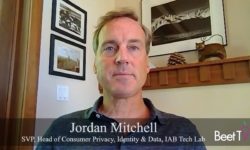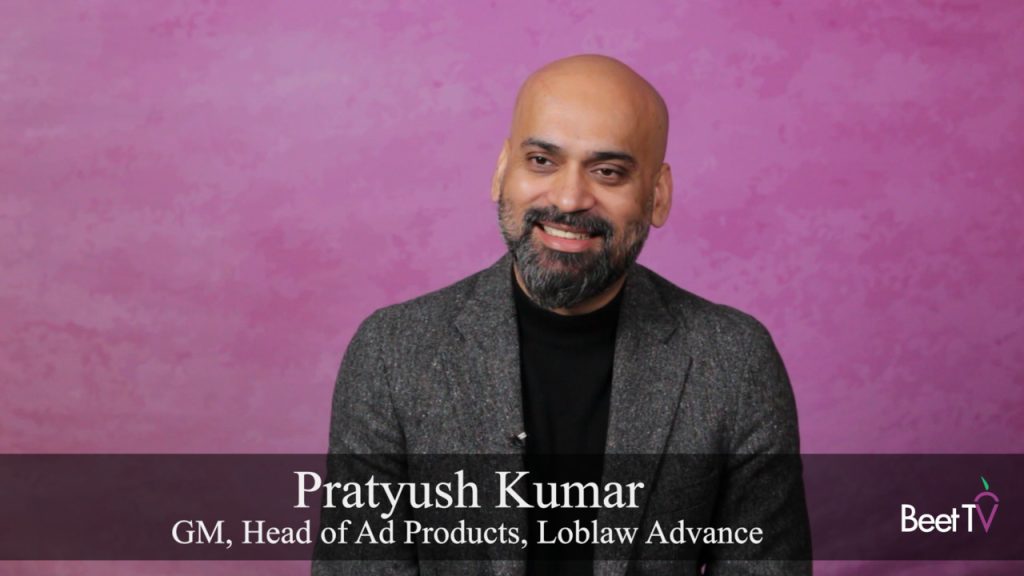By ripping up the fabric of ad targeting on iOS devices in pursuit of consumer privacy enhancement, Apple will impact advertisers and publishers alike.
That is the view of one marketing executive who has been trying to solve this kind of problem for several years.
Apple is due to change its Identifier for Advertisers (IDFA), which advertisers use to identify iOS devices so they can deliver customized advertising, to a default opt-in.
One Forrester analyst expects 70% of iPhone users may decide not to opt in.
In this interview with Beet.TV, Ric Elert, COO & President of Publicis Groupe-owned Epsilon, an outcome-based marketing company, says that will be hurtful.

Increased waste
“It’s going to be difficult, both for marketers and publishers, because they’re going to lose their ability to understand their users across sites,” Elert says.
“I think it’s going to drive up a lot of waste, because things like frequency caps and understanding consumers and giving them the right amount of information is going to be difficult.”
Some in the industry believe makers of free, ad-supported apps are going to be up-ended, whilst paid-for, ad-free apps will be left in a calmer state.
Companies won’t just have to re-examine their business models. Even many of those which are not or cannot do so are having to redesign their user flows to ensure continuity of user data.
Here are 4 ingredients #marketers need to move from mass communication to mass personalization, according to @RicElert: https://t.co/9UOOC0He4L
— Epsilon (@EpsilonMktg) September 16, 2020
Difficult to identify
“I think publishers are going to be hurt, because you’re really going to lessen the impact of quality publishers versus publishers that don’t invest that much into their quality, so their pricing is going to be normalised because of it,” Epsilon’s Elert says.
“It really makes it harder for our customer base to identify their users and talk to their users in a more personalised manner.
“The concern from clients was definitely, loss of personalization, loss of ability to optimise and control their spend, because it really keeps them in the dark on that piece of the business.”
How Epsilon Is Future-Proofing For The Loss Of Online Identifiers https://t.co/NJnvHVen1g
— Ric Elert (@RicElert) September 17, 2020
Delayed change
Apple had been due to make the change in this month’s iOS 14 release, but has delayed the change to early 2021 amid industry concern.
It is the latest disruption to digital ad targeting, coming amid the deprecation of third-party cookies, with Chrome due to follow Safari and Firefox in the next couple of years.
“We’ve actually engineered a privacy-by-design platform from the ground up over the last eight years to deal with things like decentralised individuals, loss of third-party cookies, all those things that are starting to come into fruition,” Elert explains.
Epsilon’s objectives
Publicis Groupe acquired Epsilon in July 2019 for $4.4 billion, rendering it Publicis’ sole data-tech platform.
Elert says the company had three targets in the early days following that acquisition:
- “A 90-day integration goal, where we used our core ID and our data to integrate with Publicis’s products right off the bat, so that we started using them across the Publicis’s landscape. We hit that goal in 89 days, and we’re very proud of that.”
- “To work within all the aspects of the Groupe, to centralise all the product development and product solutions within Epsilon, so that we could drive greater scalability for clients across the Groupe. We’ve expanded that and rebranded it as Epsilon People Cloud.”
- “Providing a greater ability for our clients to manage their first-party data, to really leverage that in all their marketing aspects and to understand their consumers at a very disaggregate level.”
Next-up, Elert is targeting driving data and identity capabilities deeper into all of the client base, and expanding into EMEA and APAC regions.
This video is part of Advertising in a Time of Privacy-Centricity, a Beet.TV series presented by AppsFlyer. For more videos from the series, please visit this page.




































